New Delhi – Prime Minister Narendra Modi announced that the Indian government is actively working to get ‘Chhath Puja’, one of the country’s most vibrant and ancient festivals, included in UNESCO’s list of intangible cultural heritage. He described the move as a step toward giving global recognition to a tradition that embodies faith, nature, and community spirit.
Speaking at an event celebrating the festival, Modi said Chhath Puja represents India’s deep cultural roots and its harmonious relationship with nature. “Chhath is not just a festival; it is a celebration of the Sun, water, and human devotion. It connects millions of people through faith and discipline. We want the world to see its beauty and significance,” he said.
Chhath Puja, primarily celebrated in Bihar, Jharkhand, Uttar Pradesh, and parts of Nepal, involves four days of rituals dedicated to the worship of the Sun God and Chhathi Maiya. Devotees observe strict fasts, stand in rivers to offer prayers, and gather at ghats during sunrise and sunset in scenes marked by devotion and communal unity.
Modi highlighted that the government has already initiated the process to prepare the formal nomination dossier for UNESCO. “Our cultural traditions are India’s strength. By taking Chhath Puja to the international stage, we are honoring the legacy of our ancestors and sharing it with the world,” he said.
The push to include Chhath Puja on the UNESCO list reflects India’s broader cultural diplomacy strategy, which seeks to showcase its diverse heritage globally. If accepted, the festival would join other Indian traditions such as Yoga, Kumbh Mela, and Durga Puja that have already received UNESCO recognition.
Communities across India have welcomed the announcement, calling it a moment of pride for millions who celebrate the festival with devotion each year. Cultural experts say that recognition from UNESCO would not only preserve the rituals and traditions of Chhath Puja but also boost cultural tourism in the regions where it is celebrated.
For many, Chhath Puja is more than a festival — it is an emotional bond passed through generations. The government’s efforts to bring it global recognition are being seen as a tribute to this enduring cultural legacy.

